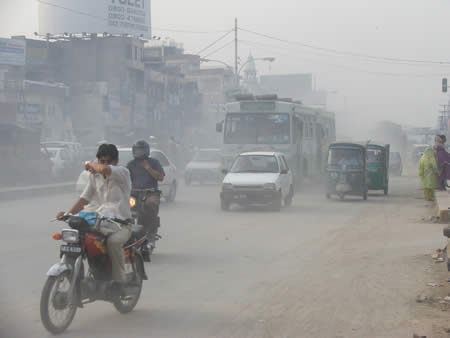From Paris To Lahore High Court: Enforcement Of Pollution Charge Rules And Rulings Towards Sustainable Development
Winston Churchill once said: “We shape our cities and our cities shape our lives.” Imagine what kind of lives our future generations would be living tomorrow if environmental laws do not get not implemented today in the cities where we dwell, in order to stave off the contagious effects of environmental degradation.
Keeping this into consideration, in an environmental petition pending before the honourable green bench Lahore High Court, I argued on behalf of the petitioner, by challenging the vires of Pakistan Environmental Protection Agency Environmental Impact Assessment and Initial Environmental Examination Regulation 2000. In the constitutional writ petition it has also been contended that the Punjab Environmental Protection Agency has failed to perform its statutory obligations to implement Pollution Charge Rules 2001, as a result of which the historical city of Lahore and the other cities of Punjab are being polluted due to the lack of adherence of environmental laws by the factory owners.
On January 22, 2016, the honourable judge Justice Syed Mansur Ali Shah directed Punjab Environmental Protection Agency to produce the data regarding implementation of Pollution Charge Rules by 11.30 am on the same day. When the Environmental Protection Agency could not produce any data and admitted the non-implementation of Pollution Charge Rules 2001, the Lahore High Court’s honourable judge issued directions to the Punjab Environmental Protection Agency to make the department work efficiently and implement the Pollution Charge Rules by forming an inquiry committee in collaboration with the Lahore Chamber of Commerce and submit the report on the next date of hearing regarding the implementation.
It was also strictly directed to Government of Punjab to take action against factory owners and businessmen who are blatantly violating the Pollution Charge Rules and not paying the penalty for adversely affecting the common citizen’s life through aggravated pollution levels which have risen exponentially. It was also directed by the honourable Justice Syed Mansur Ali Shah that proper sectoral guidelines should be formulated regarding preparation of the environmental impact assessment of a project under Pakistan Environmental Protection Agency Environmental Impact Assessment Regulations 2001.
As counsel on behalf of the petitioner, a social activist, I also argued that after the Paris Agreement, (an extension of United Nations Framework on Climate Change Convention), signed in 2015 to curb the pollution and environmental degradation, it is of utmost necessity to implement the Pollution Charge Rules. Both the amicus curiae, Saima Khwaja and Rafay Alam, also appeared and agreed with my submissions, further submitting that as long as Punjab Environmental Protection Agency and its monitoring units do not perform their statutory obligations, the whole province of Punjab will continue to get adversely affected by the increasing industrialization and commercial activity.
Similarly, in another environmental petition, the Lahore High Court’s honourable Justice Abid Aziz Sheikh on January 25, 2016 directed the federal and Punjab government as well to strictly comply with the environmental laws applicable in Pakistan during the construction of the coal power plant at Sahiwal with a capacity of 1320 MW and disposed off the petition accordingly. It was vociferously argued by me on behalf of the petitioner, Zubair Niazi, a social activist, that the construction of the coal power plant had commenced without compliance with National Environmental Quality Standards and Pollution Charge (Industry Calculation) Rules 2001.
In juxtaposition with these developments, the Climate Change Conference took place in Paris in 2015 and, as a result, an agreement was signed in which the world agreed to limit the global average temperature increase to below two degrees. As a result of this activity 187 countries submitted their “Intended Nationally Determined Contributions” documents promising actions to curb the environmental degradation at home.
Pakistan will be submitting its Intended Nationally Determined Contributions document in the near future regarding mitigation actions against the global warming effects arising out of green house gas emissions such as carbon monoxide and sulphur dioxide. The recent Paris Agreement has set developing countries to take precautionary measures and consolidate their regimes in order to curb the rising levels of pollution, and with the recent directions by the honourable Lahore High Court in both cases briefly discussed above, the Government of Punjab needs to implement Pollution Charge Rules 2001 as well as Punjab Environmental Protection Administrative Penalty Rules 2013 in the entire province by taking stern action against the businessmen and factory owners who show no concern towards how a common man is being adversely affected by their nefarious activities which are solely meant to maximize their profits rather than make any contribution towards sustainable development.
Another worrying aspect is the collusion of businessmen with politicians, that does not allow the environmental regime to function independently and autonomously which thus remains under a ‘regulatory capture’ (a term defined in 2015 SCMR 1739). The influence of ‘corporatocracy’ will always resist the implementation of environmental laws in our country.
Nevertheless, keeping into consideration the Lahore High Court’s decision, which coincidentally transpired with the recent conclusion of the Paris Agreement, not only must the Government of Pakistan abide by its international obligations but it also has to comply with the court’s order. So I conclude with the observation that public interest litigation and the exercise of judicial review powers by the superior courts can surely make an impact on the policy making process of the government.
Hats off to the honourable Lahore High Court for giving a timely decision at this juncture after two long years of court proceedings.
The writer appeared as counsel in both environmental cases before the honourable green bench of the Lahore High Court.
The views expressed in this article are those of the author and do not necessarily represent the views of CourtingTheLaw.com or any organization with which he might be associated.


